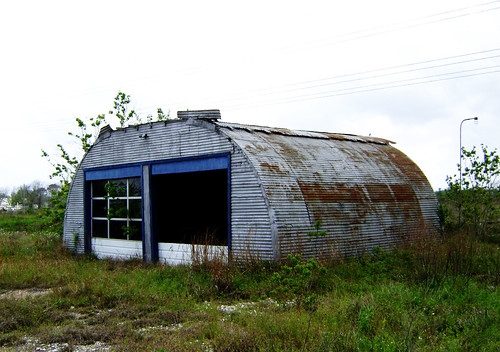Instead, it seems like the place where the surrounding churches might do their ritual sacrifices. Isn't that what churches do? Anja said it smelled like livestock. Obvs. lambs.
 Photo by happy-dee-dooo.
Photo by happy-dee-dooo.
 Photo by happy-dee-dooo.
Photo by happy-dee-dooo.
 Quonset 2, north of Dickinson Bayou at Hwy 146, Texas 0404091454, by accent on eclectic
Quonset 2, north of Dickinson Bayou at Hwy 146, Texas 0404091454, by accent on eclectic
 Don't jump pal!, by Cleber Mori
Don't jump pal!, by Cleber Mori

 Gary Cooper, Martha Gellhorn, Sandra Shaw, and Ernest Hemingway
Gary Cooper, Martha Gellhorn, Sandra Shaw, and Ernest Hemingway Breathe. Photo by Beny Shlevich
Breathe. Photo by Beny Shlevich Similarly with travel. Outside of the exceptional person capable of profound change, travel is generally not formative. But in our recollection of the past, we often point to important trips as "moments" when everything changed. We want to remember travel for its alleged formative nature; we do not want to acknowledge its lack of actual formative influence.
Similarly with travel. Outside of the exceptional person capable of profound change, travel is generally not formative. But in our recollection of the past, we often point to important trips as "moments" when everything changed. We want to remember travel for its alleged formative nature; we do not want to acknowledge its lack of actual formative influence. 
So, I have a sore throat, which almost never happens. In fact, last time I had a cold was over two years ago. I was so appalled by the Terrible Betrayal that I actually took a flashlight this morning and looked at my throat in the mirror, and found one of my tonsils all swole up. Like Doubting Thomas, I had to touch it, and it has the size and approximate consistency of a shooter marble. It almost reaches my uvula (which I have always looked upon as the body part most nearly like those hangy-downy things that for unknown reasons obscenely caress the top of your luggage when it goes into the x-ray machine at the airport).
This just in: don't try to gargle with seasoned rice vinegar in warm water. Its failure as a therapeutic vinegar is second only to that of balsamic.
Added: I kind of suck at gargling.
So, anyway, I drove Mom and Dad and Anja up to the de Young in San Francisco to see the Impressionist exhibit. It was refreshingly not full of the paintings-I'm-ready-to-set-on-fire-because-I-have-seen-them-on-pretty-much-every-calendar-and-"inspirational"-wall poster-ever category, though, really, dude, I don't think even fat women need to be painted as though their torsos look like the bodies of annular worms.
According to an article in Smithsonian Magazine from February, 2010, "As long ago as 1913, the American Impressionist Mary Cassatt wrote a friend that Renoir was painting abominable pictures 'of enormously fat red women with very small heads.'" I'm not sure I would agree with "enormously," though nor would I agree with L.A. County Museum of Art's Claudia Einecke, who claims, “He’s using the body for expressive purposes. Hopefully, nowadays, we understand that beauty or the body comes in many different shapes. People can stop saying, 'Oh yuck, these are ugly, fat women.'" I don't care that the women are fat, but that they LOOK LIKE ANNULAR WORMS. Maybe that was your impression, Renoir, but in this case I will say your impression was dumb.
Oh, and I don't have cryptic tonsils, I just really like the phrase.
She's gone back to crying for pets, and running around, and being ridiculous and my life is thus much improved and I'm grateful to my vet, despite the expense, and I'm weirdly grateful to HER for being kind enough to get better.
Nature Note: The California Poison Oak
Dry summers flaw the leaf to a rose flame
Where, as a vine, it seems to flicker higher
Than live-oaks it consumes, or where it leaps
As a free-standing shrub or tree—ablaze
In wild-oat hay fields. Yet, with winter come,
The stems shrink back and almost disappear
In sinuous tangles, while a few white drupes
That look like snowberries hang to trick the eyes.
Nothing will warn but old experience
The ignorant damp hand that comes to dig
In winter rain the dormant trillium:
Seeking to bring a wild spring beauty home
It finds, as parasitic as a drug,
Pain stinging flesh that brushed the stems but once.
This year, Mom is doing Recipe-a-Day, in which she is rewriting her recipes onto new cards. She's quite exercised by the whole idea, and had it planned months ago. I, on the other hand, just figured out that in the interest of writing, a skill I fear I am losing (if I ever had it, really) I am going to do a Post-a-Day. I don't know if anyone will read them, but that's not the point.
So, random thought for New Year's Day: as I listen to my various public radio podcasts, I keep hearing a sponsorship message about the new Chevrolet Volt, with the tagline, "It's More Car Than Electric." My reaction, every single time is, "No, it's not."
I like this person's take on the slogan: "Maybe 'The electric car you can just put gas in on those days when you’re not giving a crap about the environment' was too long."